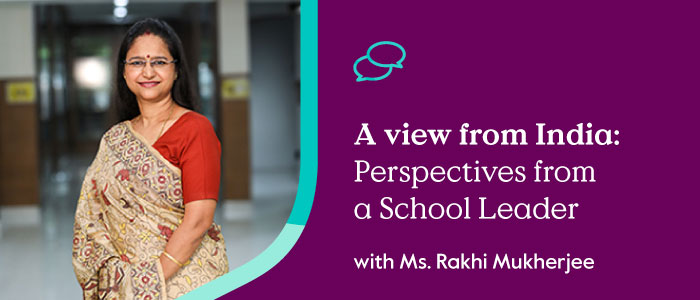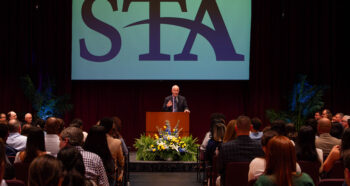Story highlights
- Schools must support teachers to undertake professional development
- The value of the Cambridge International Diploma in Teaching and Learning
- What the future of professional development in schools looks like
Ms. Rakhi Mukherjee is a school leader at a Cambridge International school in India.
Utpal Shanghvi Global School and Prabhavati Padamshi Soni International Junior College was one of the first schools in India to implement the Cambridge International Diploma in Teaching and Learning and is known for being a strong advocate for professional development for teachers.
In the first of our series of blogs from school leaders in India, Ms Mukherjee tells us why she feels strongly about equipping teachers with the right skills to enhance the quality of teaching and learning in their classrooms.
Continuous Professional Development is essential for teachers to remain abreast of the latest trends, technologies, and teaching practices. It allows teachers to reflect on their own teaching, identify areas of improvement, and explore new skills and techniques that can improve student engagement and outcomes.
Teachers must be encouraged to continuously improve their knowledge and teaching methods. Developing a better understanding of their subject will help teachers to exude confidence and inspire their students to thrive. Teachers and administrators who continuously develop their own knowledge and skills, show students that learning is important and useful. This in turn manifests into an overall positive classroom and school community.
In India, the National Education Policy 2020 insists on fifty hours of professional development in the academic year. This allows teachers to assess and reevaluate their progress.
However, seeing as teachers are playing multiple roles in both their professional and personal lives, including professional development in their priorities requires a strong supportive environment in the school. It is the role of a school leader to ensure this and to be considerate of teachers’ time and workload.
Professional development in our school
In our school, we have implemented various initiatives to provide our teachers with meaningful professional development opportunities.
We enable teachers to be reflective practitioners and analyse their lesson plans to ensure they promote active learning, reasoning, interdisciplinary understanding, critical thinking and different perspectives.
We recognise the importance of teachers learning from each other, so we tailored our professional development to foster collaboration and cross-sharing of expertise. Our in-house curated training workshops allow teachers to develop new skills and learn from their peers.
We also encourage experienced teachers to mentor new teachers, creating a culture of continuous learning where best practices are shared. During our faculty meetings, we facilitate interactive and real-time discussions with hands-on projects, using special techniques and ice-breaking games to introduce teachers to new teaching methods in a fun and engaging way. Our teachers also engage in Cambridge teaching workshops that provide opportunities to network with other educators for wider learning, debates and discussions.
Cambridge International Diploma in Teaching and Learning
We were one of the first schools in India to implement the Cambridge International Diploma for Teachers and Learners (CIDTL) in our school. The majority of our staff have completed the Cambridge International Diploma for Teaching and Learning with distinction and are postgraduates.
One of the initiatives by the school management is to ensure that all our teachers take the Cambridge diploma so they can effectively implement the Cambridge curriculum.
Another thing we appreciate about the Cambridge curriculum is that it doesn’t limit teachers to a fixed set of teaching methods, instead, it promotes exploration and experimentation, allowing teachers to customise their teaching techniques to suit the specific requirements of their students. Since the teachers dedicate extra time and effort towards the Cambridge International Diploma in Teaching and Learning, the management also provide them with incentives.
Cambridge Professional Development courses for teachers
The Cambridge Professional Development courses empower teachers to approach teaching with a reflective mindset. The extensive resources provided by Cambridge allows them to dive into academic knowledge and be more engaged, resulting in effective teaching practices.
In our school, the teachers who take part in the courses find that their classrooms become more student-centered. This in turn propels a sense of ownership in students, allowing them to take an active role in their own education.
Looking ahead
As we look to the future of professional development, it is evident that the landscape will be shaped by rapid advancements in technology. With automation and artificial intelligence becoming increasingly prevalent in our daily lives, it is important for teachers to help students to cultivate skills such as critical thinking and emotional intelligence.
In an educational context, this means a shift towards metacognition and teaching students how to learn, rather than simply what to learn.
Students and teachers should be taught how to collaborate with Artificial Intelligence to enhance their learning. For instance, finding positive uses for ChatGPT, rather than seeing it as a threat.
Professional development must also encompass training on how to effectively engage with the community as co-teachers and partners in the learning process.
As new challenges and opportunities present themselves, the key to success in the future of professional development lies in embracing change and staying curious, flexible, and adaptable.
Register your interest to become a Cambridge school in India here





